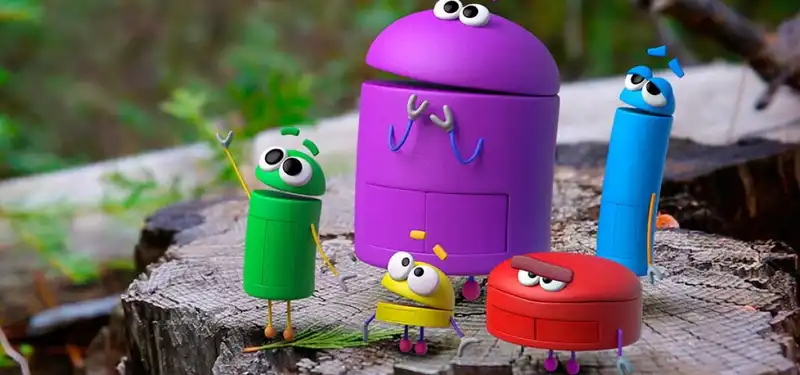Oct 31, 2016
How did Jibjab break all the rules for its first series, Ask the Storybots?
[Evan Spideris, who co-founded JibJab with his brother Greg in 1999, says. 'When it comes to talent, we can go toe-to-toe with any of the big studios. [That talent has helped Jibjab grow into an 80-person digital entertainment company that generates revenue through e-cards, emojis, GIFs, e-learning apps, and most recently a sticker app for Apple's iMessage. The only piece of the puzzle that was missing was a full-length showcase where the studio's artists could stretch out and fully showcase their talents.But that changed in August when Jibjab premiered Ask the Storybots, a six-episode original preschool series on Netflix. For those with children, Storybots may already be familiar with the five cylindrical creatures named Beep, Boop, Bing, Bang, and Bo. The idea was launched in 2012 as a digital brand that includes e-books, apps, and online videos.
The Netflix shows are mixed media, combining puppetry, CGI, live action, and 2D, sometimes all in the same shot. In each 30-minute episode, Storybot investigates a child's question, such as "Why is the sky blue?" or "Where do French fries come from?" and tries to come up with a scientifically accurate answer.
The Spiridellis brothers understood the importance of making a strong impression with their first studio feature project. Especially given that the market they were trying to enter (early education) is known for its programming, which is, as the Spiridelis put it, "rote and saccharine."
The show was set up "so that each individual artist could make a significant contribution," says Spiridelis. 'There is no style that runs through the entire show. For example, when the storybots enter the human world, they always appear in CG, and at the storybot headquarters they have a 2D look with no outlines.
Other sequences, however, are left to the artist's interpretation. Spiridelis explains it this way. In other words, "You like to draw like this," "Then draw like this," "You like to make dolls. You like making dolls, don't you?
Another unique aspect of this work is that the majority of it was created in-house at the company's Venice, California headquarters. says Spiridellis. 'We can board, design, animate, post-post, and do everything in-house.' Says Spiridellis. More than 95% of the series was produced at the company's studio, with a few people contracted remotely."
If changing the appearance of the characters throughout the episodes and producing the show almost entirely in Los Angeles is an unconventional approach, then the business side of producing "Ask the Storybots" is truly bizarre. Jibjab paid for the production of the Netflix series entirely on their own, an arrangement almost unheard of in Hollywood. This is an almost unprecedented arrangement in Hollywood. Says Spiridellis, "It's sort of the first rule in Hollywood that you don't fund your own projects." 'But we believed strongly in that. And by keeping someone else's money out of the gate, it gave us the freedom to build whatever we wanted."
There are clear advantages to self-funding a production, the first of which is that Jibjab retains ownership of the episodes and can continue to use them for years after its contract with Netflix ends. However, Spiridellis cautions that this approach may not work for other companies.
That's because for JibJab, the Storybots TV series is not the end goal, but just another stepping stone to turning Storybots into a multiplatform franchise. Says Spiridellis. 'We were able to gamble our own money to finance it because there are other ways to make money from our content besides this TV production. For us, the TV show is one piece of the overall puzzle that allows us to build awareness of this character and brand."
While JibJab still has to rely on partners for distribution (Apple for apps, Netflix for broadcast), it has done some amazing things that few independent studios have been able to accomplish.
Earlier this month, JibJab announced its second Netflix series, Storybots Super Songs. This is a five-episode series that cleverly repurposes content from the existing Storybots online music video library, adding wraparound material.
Spiridellis says further announcements regarding the expansion of the Storybots universe are still forthcoming. Whatever that announcement may be, we expect the Spiridelis brothers to put their own twist on it.
"Ask the Storybots" is available on Netflix.
Cartoon Brew will be releasing exclusive new behind-the-scenes footage of "Ask the Storybots" production in the coming days.
.



Post your comment